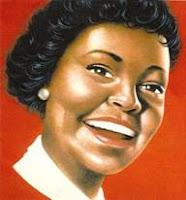"You are erasing her legacy." If any of these people bothered to look up the history of the Aunt Jemima brand (and you know I did) they would realize that Aunt Jemima was a fictional character, named after a minstrel tune. When the company started in 1889, the packaging initially featured a caricature, something we would consider extremely racist if it were to turn up on a box today.
They didn't use a lifelike image of Aunt Jemima until 1893 when they decided to have her appear at an exposition in Chicago.They hired Nancy Green, a former slave who was a cook for a judge. Some posts claimed that she became a millionaire, others claimed that she was extremely well paid. Let's think about that for just a minute. Nancy Green died in 1923. So she had the role of Aunt Jemima from 1893 until 1923. Women in the United States didn't even have the right to vote until 1920. You think she was well paid? To this day there is wage disparity between women and men. There is still disparity between white and black. Do you really think they would have paid a black woman generously? If she was being paid generously there would have been no need for her to continue working as a housekeeper.
There were also other woman who portrayed Aunt Jemima. Several families have sued on their behalf. Some claim that their ancestor invented the pancake mix. (If that's true, the evidence is very well hidden.) Others claim that their ancestor "tweaked" the recipe. I can't determine whether the second Aunt Jemima's last name was Harrington or Robinson. Different articles site different last names although the first name of Anna is consistent. Then there were "ambassadors: Lillian Richard was the ambassador for Texas. Her family is upset that the brand is being retired. Not quite sure why, she has a historical marker sign in her home town. Nobody is taking that down.
"I never looked at her as a slave, I just thought she was a strong woman." Really? Why would you think of a woman on a pancake mix box as a "strong" woman? How do you feel about Betty Crocker? Is she strong, too? Fortunately for Betty, she was always a composite and never the image of a real life woman, although people did portray her on the radio and television although they usually didn't look like the image shown on her cookbooks.
"I never looked at her as a slave, I just thought she was a really good cook." Well, at least that's what they wanted you to think, so the marketing wasn't a total failure. But the fact is that her image was that of the "mammy" stereotype. "Mammy" was happy and eager to please her white family. She put her white family's needs ahead of her own needs or the needs of her own children. This isn't something that just happened before the Civil War put an end to slavery. Try reading "The Help" or seeing the movie. These attitudes are not dying an easy death.
And with other people sharing their thoughts on Aunt Jemima, I had to examine my own thoughts. Aunt Jemima pancakes have been around since before I was born. I remember seeing the box as a child because it was the brand my mother bought. (I'm not even sure there was a competing brand.) I don't think I really had any thoughts about it all when I was a child. It was a face on a box. I didn't know anybody who looked like that and I had no associations in my mind. However, by the time I was a teen, I'd seen enough TV and movies to identify Aunt Jemima with the Mammy stereotype. But it still didn't affect me. Until I went to university, I'd always gone to all white schools. I didn't know any black people. My family had never owned slaves.
The problems with race in the late 60s had nothing to do with me. I know that they updated Aunt Jemima's image in the 60s. But I didn't realize until all the fuss started that all they did then was lighten her skin a bit and make her a bit thinner. She didn't lose the bandanna and get pearl earrings until 1989, an attempt to get away from the Mammy image. But it was too little too late. Maybe if they'd made that change in the 60s instead of waiting until 1989, it might have transitioned better and they wouldn't be forced to change the name and face of the dominant brand in 2020.
But all of the fuss makes me wonder how the public will react when Progressive Insurance decides to replace Flo.




No comments:
Post a Comment